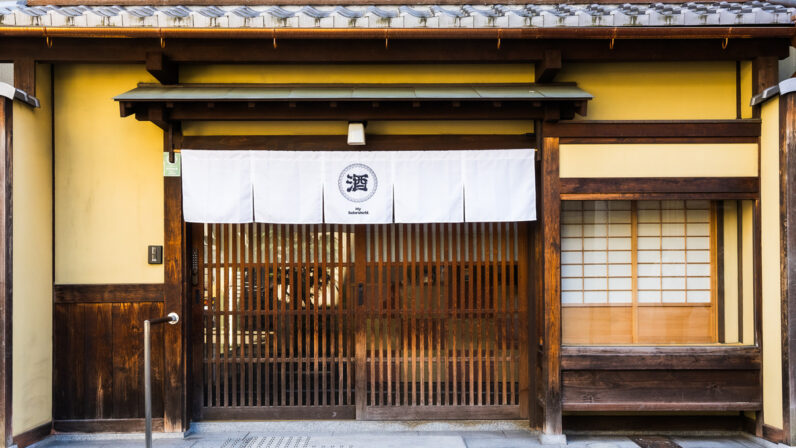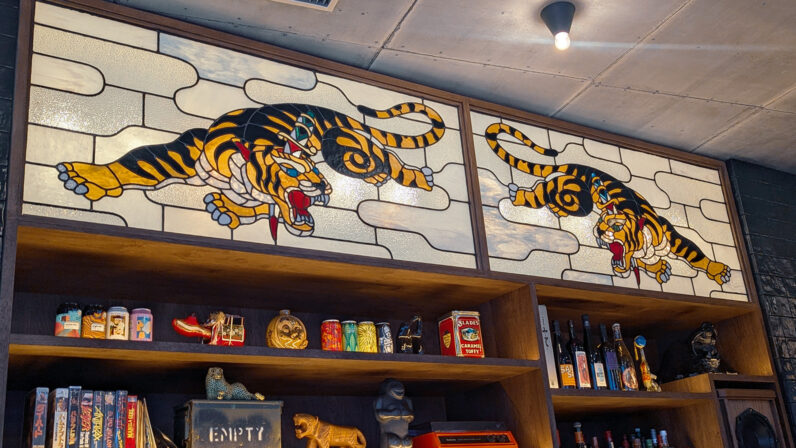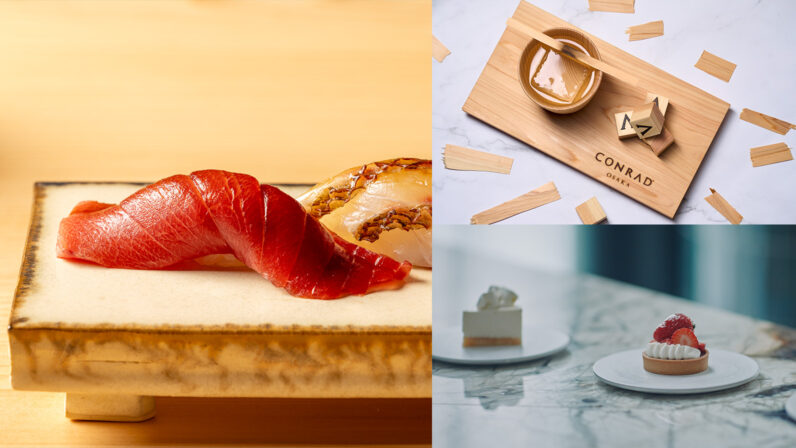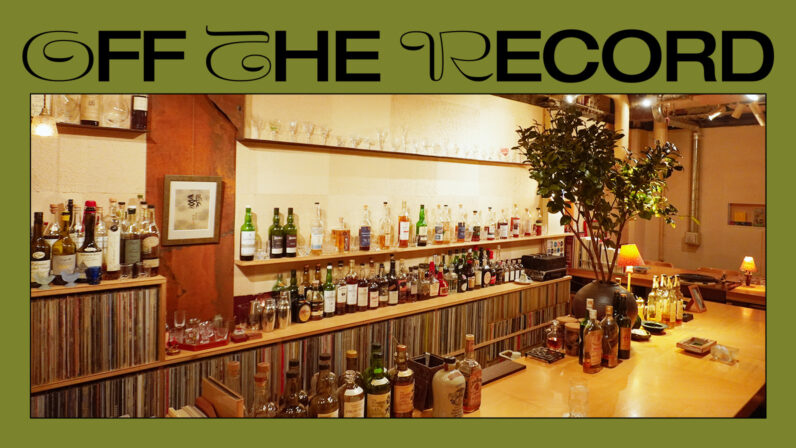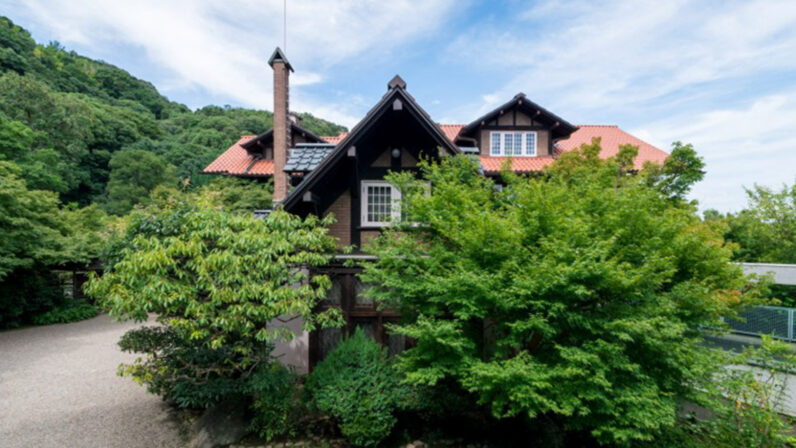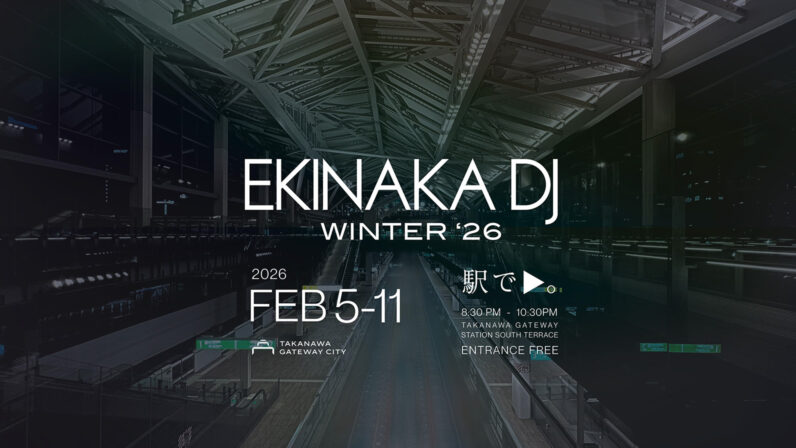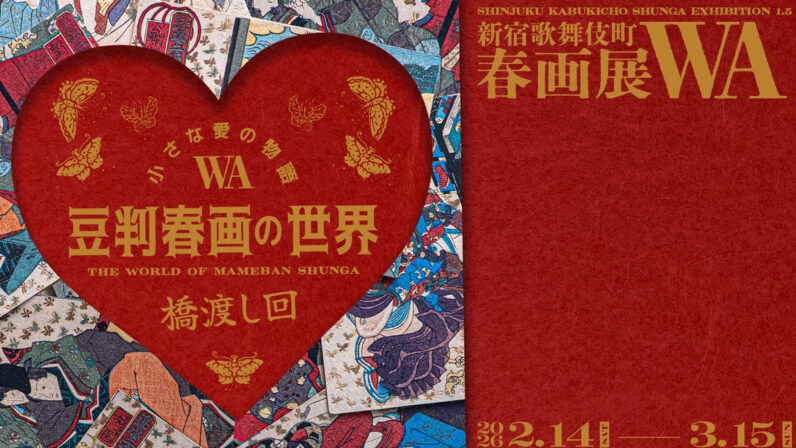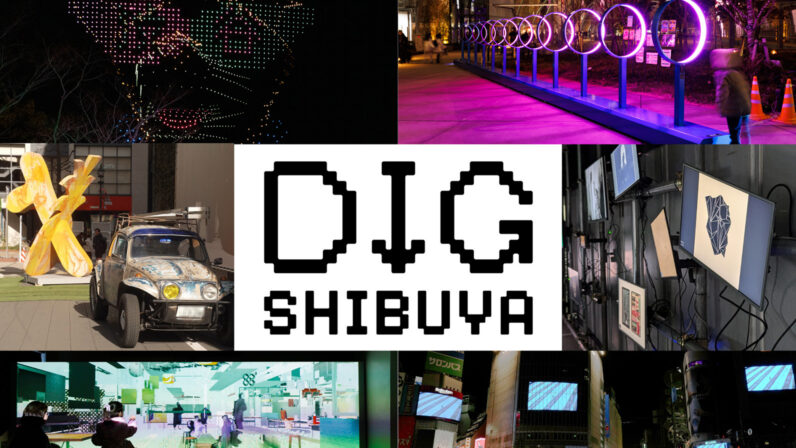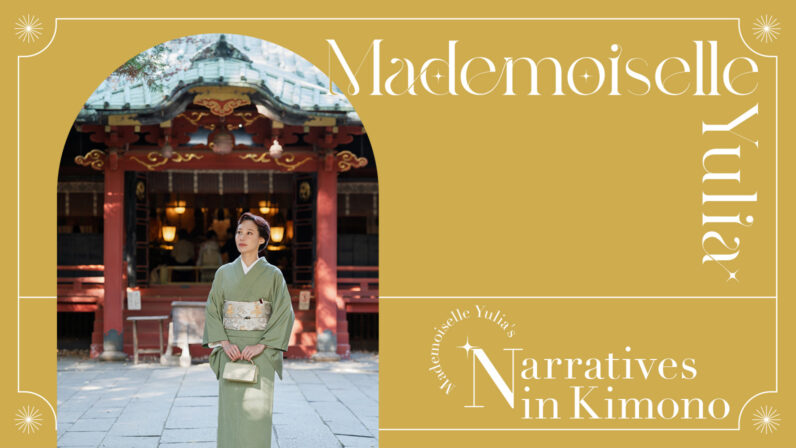On April 18, 2025, a stylish new bar called ‘Banten’ opened in Ebisu. Part of the same brand as the A10 record bar, which gained immense popularity through social media, Banten’s name reflects its concept: a space where you can enjoy the sounds of vinyl records (盤 – ban, meaning ‘record’) and savor a carefully curated selection of exceptional drinks (天たる – tentaru, meaning ‘heavenly’).
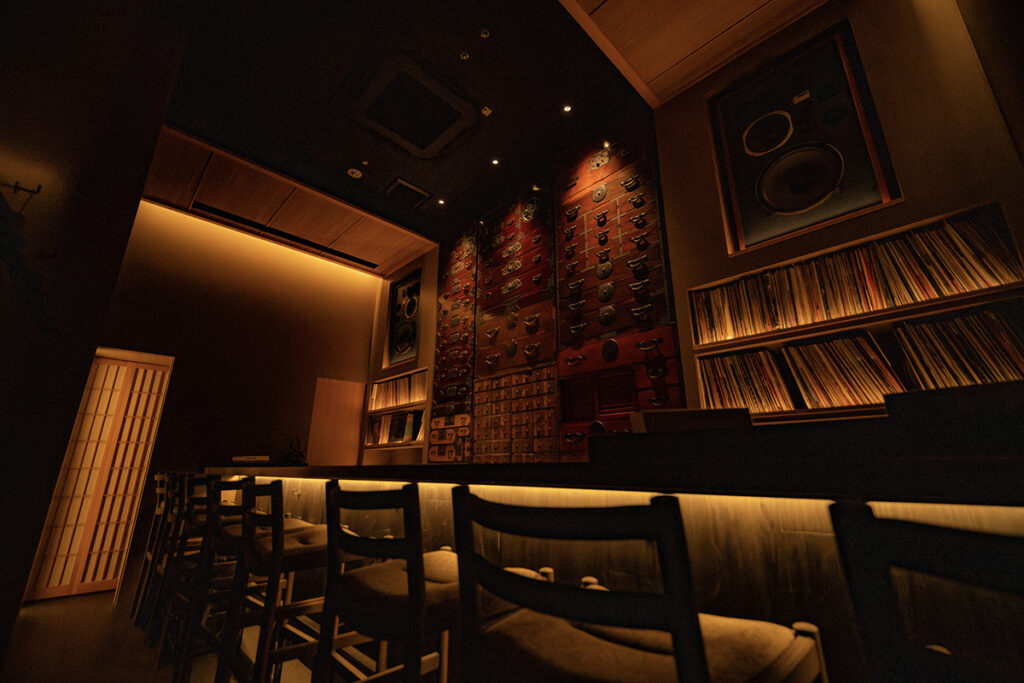
A Modern Expression of Japanese Tradition
The facade, inspired by a traditional tea room, is likely to catch first-time visitors off guard who instinctively reach for the door. But this is, after all, a sister bar to A10 and there’s a twist at the entrance. Instead of a conventional door, the lower section of the front wall opens up. Positioned low like a tea room’s ‘nijiriguchi’ (crawl-through entrance), it calls for a little care when entering or leaving.
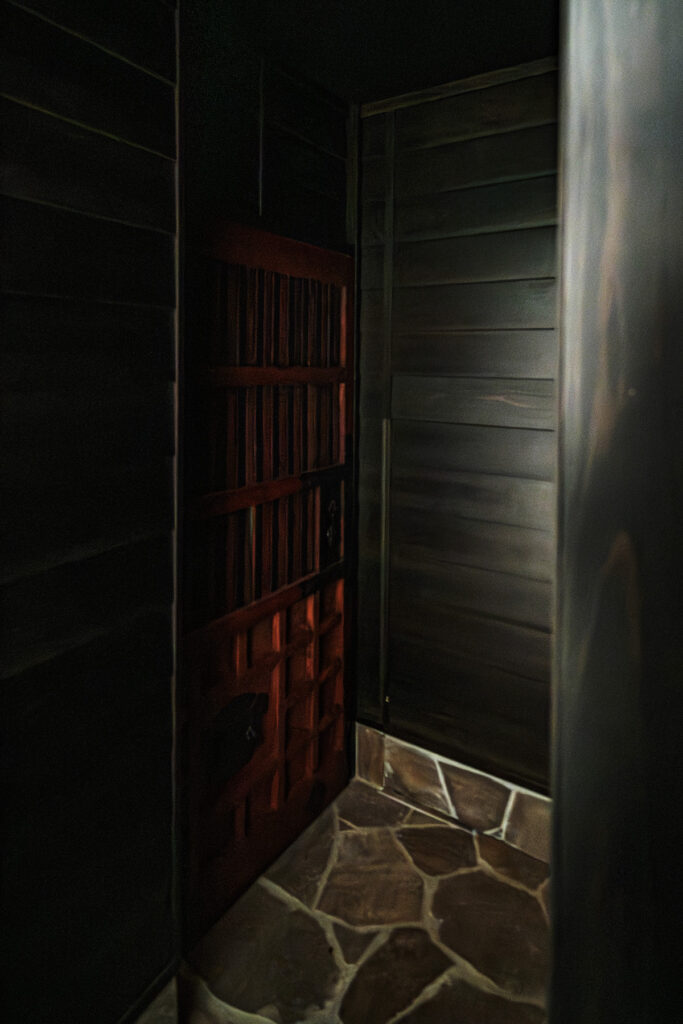
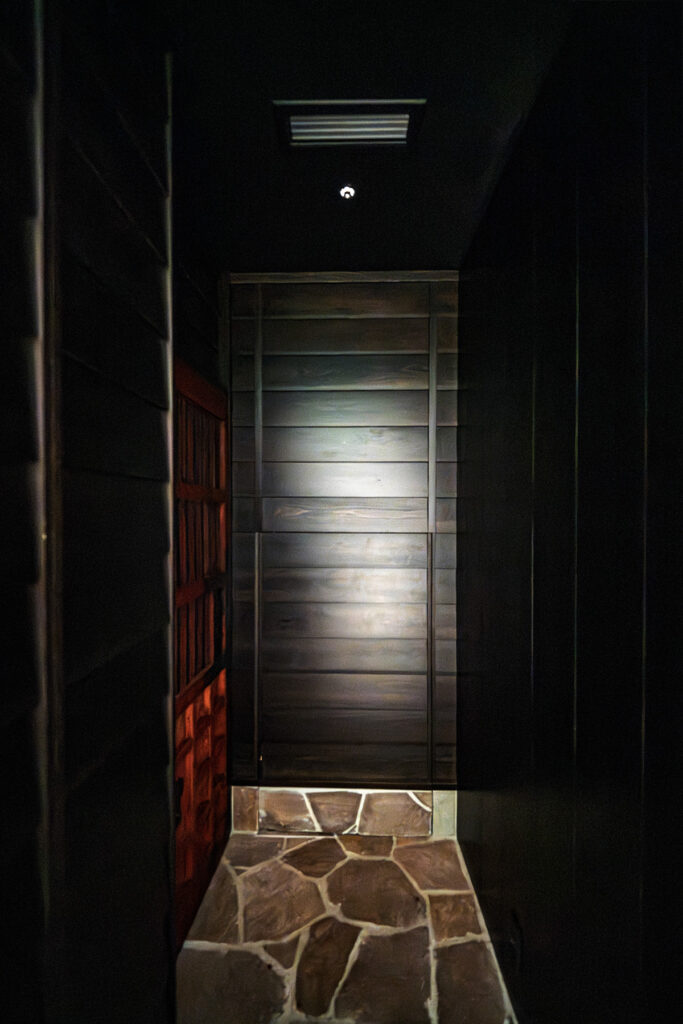
During our visit we, of course, tried to open the door on the left and ended up bumping our heads on the way out.
Step inside, and you’re immediately struck by a towering wall of traditional Japanese tansu chests stacked all the way up to the four-meter-high ceiling. The interior blends harmoniously with a collection of antique wooden furniture and decor, mostly from the Meiji to Edo periods.
In front of an old apothecary cabinet stands Takayuki Mizuno, the head bartender and manager. Dressed in traditional samue workwear, he mixes liquids and crafts concoctions with the precision of a pharmacist.
“Our sister bars A10 and A9 have been popular with international guests, and the owner had long wanted a space that served sake,” says Takayuki. “That’s how we landed on the concept of a bar rooted in Japanese culture.”
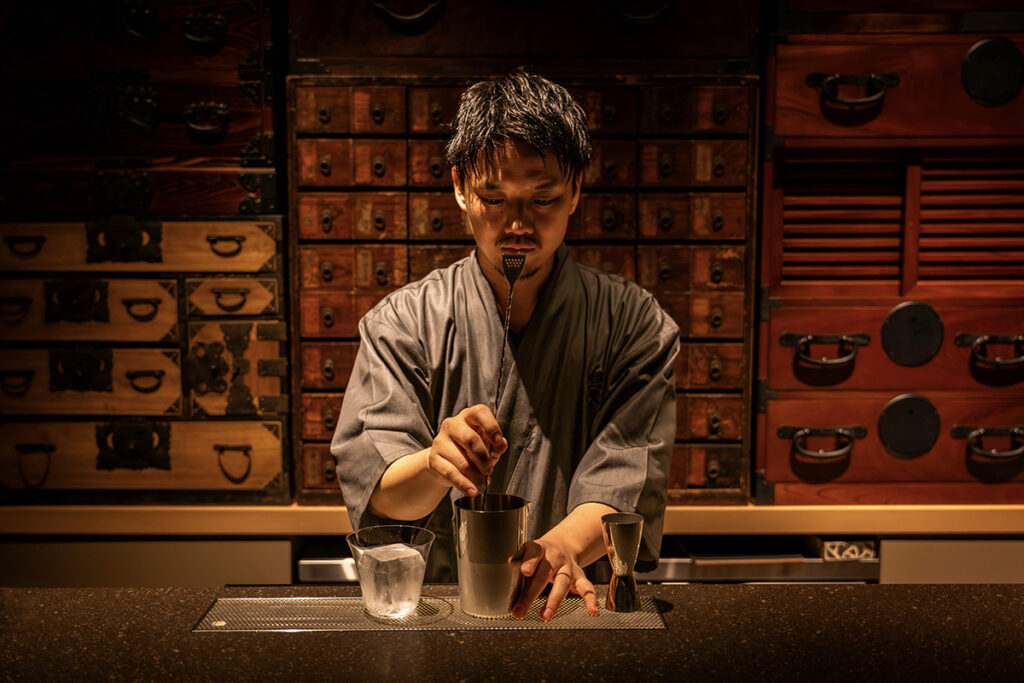
Head Bartender / Manager Takayuki Mizuno
A Conceptual Menu Inspired by the Five Elements Philosophy
The Five Elements (五行, gogyo) is a natural philosophy originating in ancient China, proposing that everything is made up of five fundamental elements: fire, water, wood, metal, and earth. This concept has greatly influenced East Asian cultures, including Japan, where it has been integrated into calendar, astrology, and many other facets of daily life.
The menu draws on this philosophy, with each element representing a distinct flavor profile. For example, under ‘Water,’ you’ll find sake and cocktails that glide down smoothly, while ‘Fire’ offers drinks with smoky or spicy heat.
“We recommend starting with the drinks under the Water category. Sip on some sake as you explore the menu, and pick a drink that matches your mood for the day.”


The menu features a lineup of original cocktails with distinctive names evoking nature and the elements, like ‘Get Fired Up!’ and ‘Rainy Forest.’ A closer look at the ingredients reveals some truly unexpected choices. Mackerel and habanero, for instance, are far from what you’d typically expect in a drink.
These inventive creations come from the liquid cuisine company led by Tomoiki Sekine of Kyoto’s acclaimed bar ‘nokishita711’. He coined the term liquid cuisine to describe a concept that goes beyond cocktails and mixology. It takes a chef’s mindset and culinary techniques, transforming any ingredient into a drink.
“Take the cocktail ‘Dirty Smoky,’ for example. We char mackerel until it’s properly seared, then combine it with fresh pineapple, barley shochu infused with Kyoto-roasted green tea, coffee liqueur, and tequila scented with cumin. It completely flips the idea of a base spirit.”
It was impossible to imagine what it might taste like, so we had to try it for ourselves.
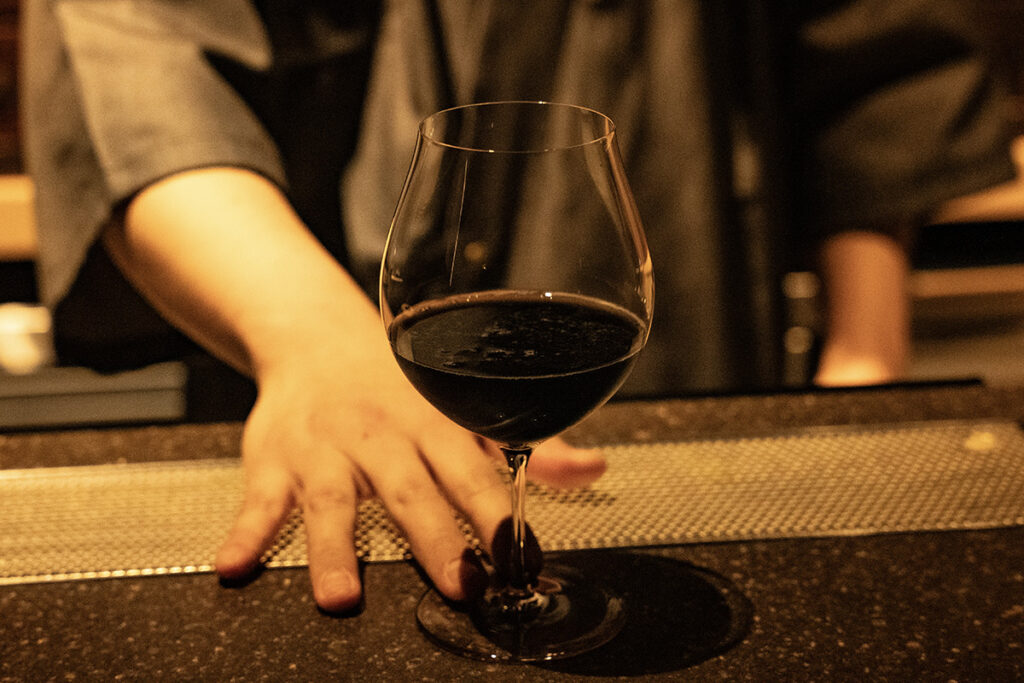
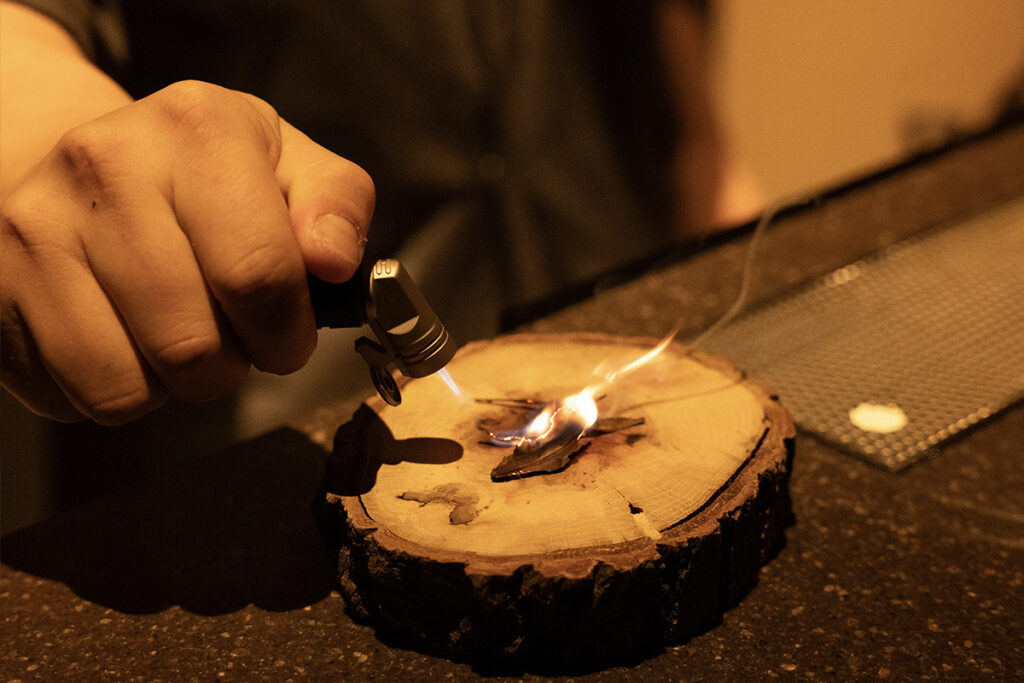
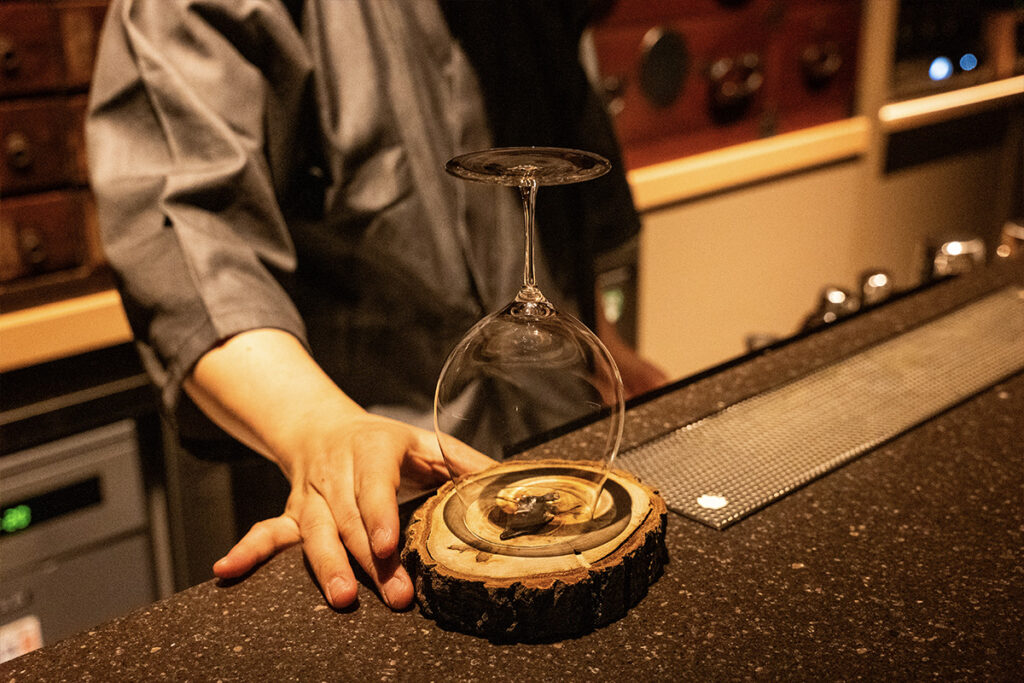
Fire Cocktail: Dirty Smoky – ¥1,700
Dark as red wine and full of character, this cocktail begins with smoke chips torched just before pouring, infusing the glass with their rich aroma.
What could a drink made with mackerel possibly taste like? With some hesitation, I took a sip, and first, a sweet tanginess hit my taste buds. Just before swallowing, the smoky aroma and a touch of bitterness emerged, followed by a subtle cumin scent that lingered in the nose. As for the mackerel, it was definitely there within the smoky flavor. There was no fishy taste, just a savory umami and roasted richness, almost like dashi.
The menu also features cocktails curated by the head bartender of A9, as well as creations by Takayuki, who has placed in the top 50 bartenders at the Diageo World Class Competition 2025. In addition, you’ll find rare Japanese whiskies like Yamazaki.
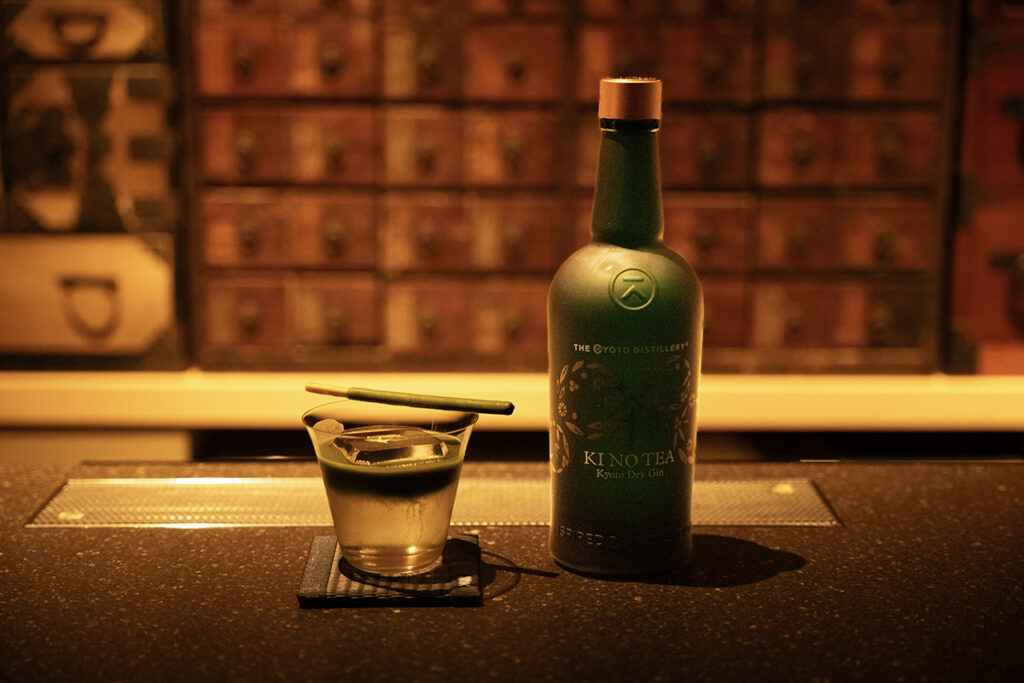
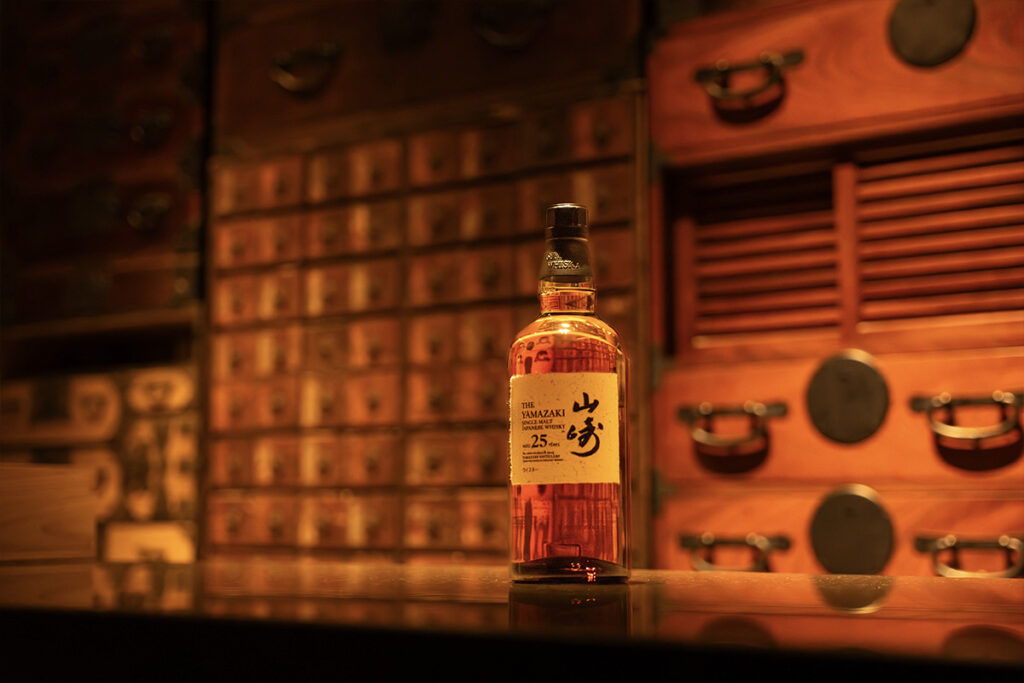
1st image : Takayuki Mizuno’s signature cocktail, Waka Tea – ¥1,600. The rich bitterness of matcha paired with the delicate sweetness of coconut water and wasanbon syrup brings to mind the taste of elevated matcha chocolate.
2nd image : The rare Yamazaki 25-year-old. Rather than being lumped into deliveries, it’s personally brought in by the supplier’s representative.
The Soothing Comfort of High-Fidelity Sound
The sound flowing from the speakers embedded in the counter wall resonates against the high ceiling and walls, gently vibrating through the air. The speakers are the classic JBL 4344 models, intentionally left without covers to blend seamlessly with the interior. The amplifier is the high-end TRIODE Musashi vacuum tube amplifier, creating a setup of incredible quality. The sound is both smooth and powerful, drawing you deeper into the experience.
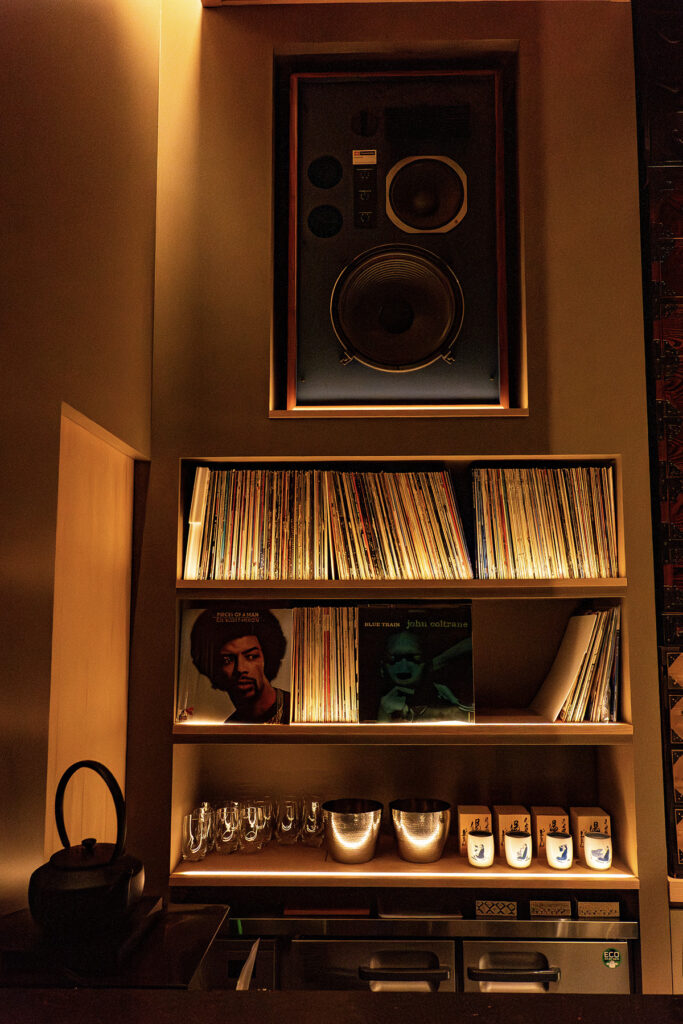
The record collection, which includes about 1,200 albums, primarily focuses on jazz, with some soul and R&B as well. Rather than a typical DJ style, the staff selects and plays music that fits the atmosphere of the moment.
“Since record bars originated in Japan, I believe what’s most important is to share the unique charm of Japan’s record bar culture. People might expect a Japanese record bar to play only Japanese music, but we don’t limit ourselves to any specific country. If someone requests it, we’ll play Michael Jackson or whatever suits the mood and ensure everyone is enjoying themselves.”
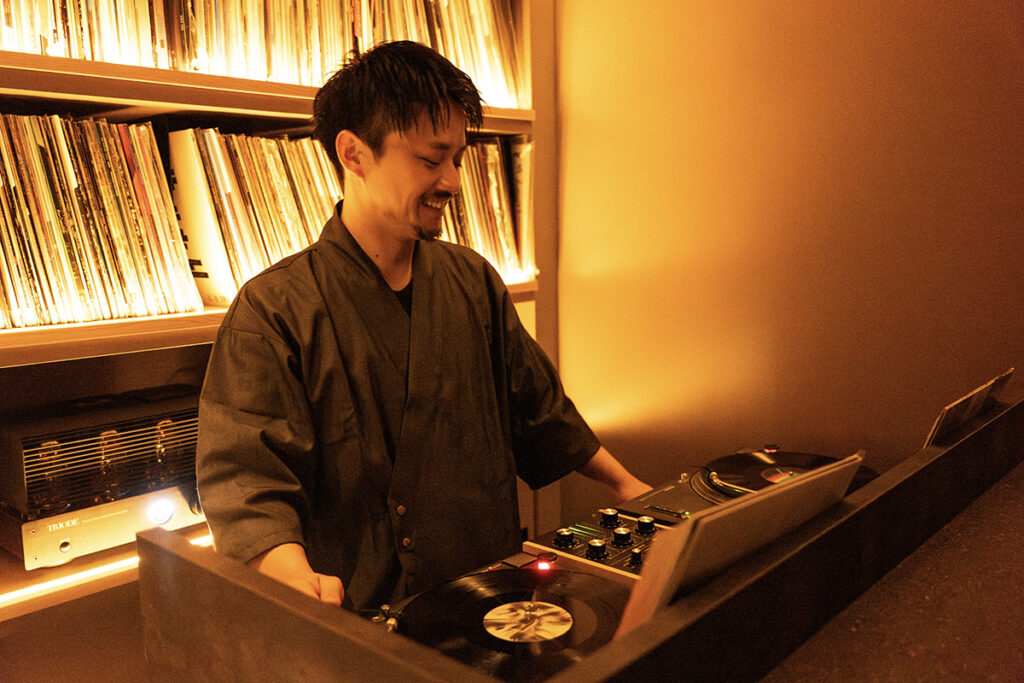
With just eight seats at the counter, the intimate setting creates a sense of unity throughout the space. The close proximity to the bar staff creates a comfortable atmosphere , making it easy to visit whether you’re with a partner or on your own. For groups of five or more, a reservation is required, ensuring that larger parties don’t overwhelm the space.
Ebisu is becoming known as a music hub, with record bars like Martha and A10 and live music venues such as BLUE NOTE PLACE. Compared to Shibuya, it has a more mature energy to it, and unlike Roppongi, it offers a more laid-back feel, making it the perfect hangout for people in their 30s and 40s.
As Takayuki explains, Ebisu offers a variety of high-quality dining options without being overly formal. You’ll find everything from Italian and French restaurants to casual yakitori joints. It’s the kind of neighborhood you’d recommend to anyone visiting Japan, with the advice that it’s worth exploring at least once.
The neighborhood has a lot of establishments that will appeal to those who appreciate a more refined experience, and Banten is definitely one of them. It’s also conveniently close to the station, so it’s a great spot for a post-dinner drink.
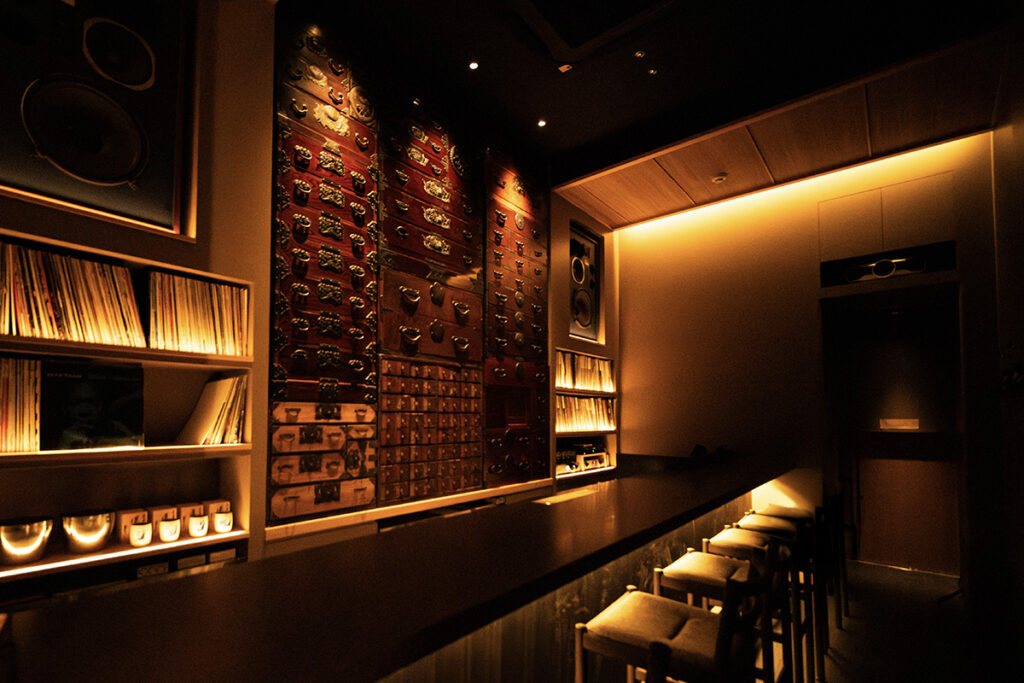
Banten
Address: 1-1-4 Ebisu Minami, Shibuya-ku, Tokyo, Murata Building 5F
Hours: 7:00 PM - 3:00 AM (Closed during New Year holidays)
Seating: 8 counter seats
Charge: Drink ¥1,200 (excluding tax) / ¥1,300 (excluding tax) and up
Website: https://banten.jp
Instagram: @banten_ebisu

